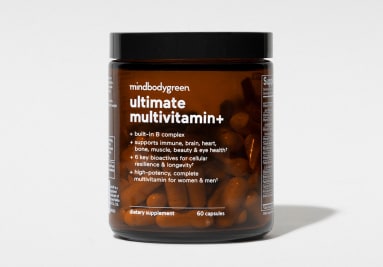2 Surprisingly Easy Ways To Reduce Dementia Risk & Slow Down Aging
Healthy aging never looked so easy!

Image by ROB AND JULIA CAMPBELL / Stocksy March 26, 2023 If you’re at all interested in supporting your longevity efforts (like we are), you may have heard that having shorter telomeres is a sign of biological aging—and thus, having longer telomeres is a sign of living a longer life. These little chromosomal caps help protect our DNA from damage, and measuring the rate of their decay over time can give us an accurate prediction for lifespan. While we don’t quite know if telomere shortening is the cause of death or simply a byproduct of it, one thing is for certain—telomere length is, in fact, associated with biological aging. And as it turns out, having longer telomeres is linked to a reduced risk of dementia as well.
Advertisement
This ad is displayed using third party content and we do not control its accessibility features.
What telomere length has to do with dementia risk
A new study published by PLOS ONE compared telomere length in white blood cells to brain MRIs in over 31,000 U.K participants and found a number of interesting correlations between telomere length and cognitive function.
They found that individuals with longer telomeres had better brain health measurements, including:
Advertisement
This ad is displayed using third party content and we do not control its accessibility features.
Shrinking gray matter volume, hippocampal atrophy, brain iron accumulation, and accelerated thinning cerebral cortex are all associated with Alzheimer’s disease. Volume of white matter hyperintensities increases with aging and is an indicator of cognitive decline.
This study’s results suggest that longer telomeres provide neuroprotective actions and help prevent dementia. Additionally, accelerated cellular aging is a potential biological pathway for neurodegenerative disease.
How to increase your telomere length for healthy aging
While the biological aging process is a bit complex, lengthening telomeres to support healthy cellular aging is surprisingly simple.
When it comes to nutrition, there are two simple tools that can help increase telomere length and promote longevity:
Advertisement
This ad is displayed using third party content and we do not control its accessibility features.
The takeaway
Telomere length has been linked to biological aging for quite some time now, and a recent study from PLOS ONE shows that longer telomeres may even play a part in protecting the brain from dementia.
Consider lengthening your telomeres with the help of a daily multivitamin and/or a quality vitamin D supplement.
If you are pregnant, breastfeeding, or taking medications, consult with your doctor before starting a supplement routine. It is always optimal to consult with a health care provider when considering what supplements are right for you.

 JaneWalter
JaneWalter 

































